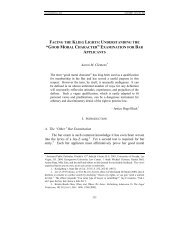The Science and Statistics Behind Spanking Suggests that
The Science and Statistics Behind Spanking Suggests that
The Science and Statistics Behind Spanking Suggests that
Create successful ePaper yourself
Turn your PDF publications into a flip-book with our unique Google optimized e-Paper software.
11-FULLER_FINAL_AFTERPROOF.DOC 2/17/2009 8:50 AM<br />
2009] THE SCIENCE AND STATISTICS BEHIND SPANKING 247<br />
learns this best through mental punishment, 16 she should get a timeout.<br />
To keep any helpful discipline method from a child may restrict his<br />
ability to mature, <strong>and</strong> could make him an unnecessary burden on society.<br />
Yet many people want to deprive children of spanking, even though<br />
the most sound research suggests it is not harmful, <strong>and</strong> is often more<br />
helpful than other common discipline methods. 17 On average, spanking<br />
16. <strong>The</strong> terms “mental punishment” <strong>and</strong> “mental discipline” are synonymous with “nonphysical<br />
punishment” <strong>and</strong> “non-physical discipline.” Just as physical punishment is intended to<br />
distress a child through physical pain, mental punishment is intended to distress a child through<br />
mental pain.<br />
17. See, e.g., Larzelere, Meta-Analysis, supra note 15, at 4 (surveying every child discipline<br />
study between 1979 <strong>and</strong> 2005 <strong>that</strong> analyzed: (1) spanking <strong>and</strong> at least one mental discipline tactic<br />
using similar research methods; (2) children <strong>that</strong> were, on average, less than thirteen years old when<br />
disciplined; <strong>and</strong> (3) at least one child outcome. This meta-analysis compares outcomes of physical<br />
<strong>and</strong> mental discipline methods, <strong>and</strong> finds <strong>that</strong> outcomes rarely favor mental discipline methods,<br />
whereas customary spanking typically reduces noncompliance or antisocial behavior more than<br />
mental discipline methods); Mark W. Roberts & S.W. Powers, Adjusting Chair Timeout<br />
Enforcement Procedures for Oppositional Children, 21 BEHAV. THERAPY 257 (1990) (showing<br />
spanking to be beneficial in enforcing timeout); Elizabeth Oddone Paolucci & Claudio Violato, A<br />
Meta-Analysis of the Published Research on the Affective, Cognitive, <strong>and</strong> Behavioral Effects of<br />
Corporal Punishment, 138 J. PSYCHOL. 197 (2004) (concluding <strong>that</strong> “corporal punishment does not<br />
substantially increase the risk to youth of developing affective, cognitive, or behavioral<br />
pathologies”); Robert E. Larzelere & G.L. Smith, Controlled Longitudinal Effects of Five<br />
Disciplinary Tactics on Antisocial Behavior, Presentation at the annual meeting of the American<br />
Psychological Association, D.C. (Aug. 2000) [hereinafter Larzelere, APA] (replicating Dr. Straus’<br />
strongest causal evidence against customary spanking, but showing the same apparently detrimental<br />
outcomes of all four types of nonphysical punishment <strong>and</strong> for taking a child to a psychiatrist); Jodi<br />
Polaha, Robert E. Larzelere, Steven K. Shapiro & Gregory S. Pettit, Physical Discipline <strong>and</strong> Child<br />
Behavior Problems: A Study of Ethnic Group Differences, 4 PARENTING SCI. & PRAC. 339 (2004)<br />
(finding <strong>that</strong>, when the child outcome is based on a source of information other than the parent,<br />
physical discipline reduces aggression in African-American men <strong>and</strong> rarely increases aggression);<br />
Robert E. Larzelere, A Review of the Outcomes of Parental Use of Nonabusive or Customary<br />
Physical Punishment, 98 PEDIATRICS 824, 827 (1996) [hereinafter Larzelere, Review] (reporting<br />
<strong>that</strong>, for older children, grounding was more beneficial than spanking; however, for younger<br />
children, spanking was more effective than nine other common punishments—including timeout,<br />
physical restraint, reasoning, <strong>and</strong> nonphysical punishment); M. Chapman & C. Zahn-Waxler, Young<br />
Children’s Compliance <strong>and</strong> Noncompliance to Parental Discipline in a Natural Setting, 5 INT’L J.<br />
BEHAV. DEV. 81 (1982) (showing conditional spanking to be more effective than reasoning or<br />
verbal prohibition when dealing with noncompliance); S. COOPERSMITH, THE ANTECEDENTS OF<br />
SELF-ESTEEM (1967) (showing <strong>that</strong> even severe or predominate physical punishment is more<br />
beneficial than love withdrawal for developing self-esteem <strong>and</strong> aspirations); D.P. Crowne, L.K.<br />
Conn, D. Marlowe & C.N. Edwards, Some Developmental Antecedents of Level of Aspiration, 37 J.<br />
PERSONALITY 73 (1969) (showing the same as COOPERSMITH, supra); Robert E. Larzelere, P.R.<br />
Sather, W.N. Schneider, D.B. Larson & P.L. Pike, Punishment Enhances Reasoning’s Effectiveness<br />
as a Disciplinary Response to Toddlers, 60 J. MARRIAGE & FAM. 388 (1998) (showing <strong>that</strong> even<br />
severe or predominate physical punishment is more beneficial than reasoning for children who are<br />
antisocial or have a need for power); Robert E. Larzelere, P.R. Sather, W.N. Schneider, D.B. Larson<br />
& P.L. Pike, <strong>The</strong> Effects of Discipline Responses in Delaying Toddler Misbehavior Recurrences, 18<br />
CHILD & FAM. BEHAV. THERAPY 35 (1996) (showing <strong>that</strong> conditional spanking is more effective

















